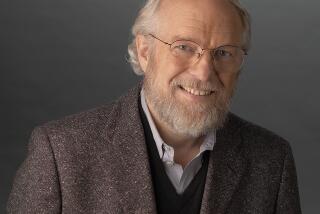John Diebold, 79; Pioneered Computer Use in Automation of Businesses
- Share via
John Diebold, an early proponent of computers who more than a half-century ago preached that automation -- a term he reinvented -- would revolutionize business and society, has died. He was 79.
Diebold died of esophageal cancer Monday at his home in Bedford Hills, N.Y., said his nephew, John B. Diebold.
Many considered computers little more than science fiction when Diebold wrote the 1952 book “Automation.” The then-radical notion of using programmable devices in daily business had grown out of a Harvard Business School project that investigated automatic control mechanisms in manufacturing.
The book attracted international attention, and its author was hailed as the nation’s top authority in the new field of electronic technology.
He was 26 years old.
Even the book’s title broke new ground. A Ford Motor Co. executive had coined the term “automation,” a simplified form of “automatization,” but Diebold gave it broader meaning. At Ford, the word described the automatic handling of machine parts. To Diebold, “automation” referred to machines doing the work of humans while also being able to self-correct.
Many found the vaguely futuristic word alarming, Diebold (pronounced DEE-bold) wrote in a 1955 story for This Week magazine, because the public feared that it foretold of factories in which robots took the place of human workers.
A Detroit radio poll showed that, second to the Cold War, the “single factor” worrying listeners most was this “strange, disquieting term,” he wrote. He added that Detroit, the center of car manufacturing at the time, was “not alone in its jitters.”
After graduating from Harvard Business School in 1951, Diebold went to work at a New York management consulting firm, which fired him three times for insisting that clients consider computerization.
“I was too early,” he once said. “It was before the first computer was installed for business use.”
In 1954, the first full-scale computer for business use was installed at General Electric’s appliance complex.
That same year, he formed John Diebold & Associates when there were only about 100 computers in the world, according to the 1967 edition of “Current Biography.”
Three years after Diebold started his corporate consulting firm in the Weehawken, N.J., home he had grown up in, he bought the firm that had fired him.
More than anyone else, Diebold “persuaded top corporations to take management information systems seriously,” Business Month said in 1989.
Over the next 50 years, Diebold counted major corporations (AT&T;, IBM, Boeing and Xerox) among his clients along with cities (Chicago and New York) and countries (Venezuela and Jordan).
Many credit him with ushering corporate America into the information age. He convinced companies to automate assembly lines, store records electronically and install interoffice computer networks.
John Theurer Diebold was born June 8, 1926, in Weehawken to William, a lawyer, and his wife, Rose. He was an avid collector and had a research laboratory at home.
During World War II, Diebold left Swarthmore College and joined the merchant marine. While at sea, he became interested in automation when he observed the crude self-correcting mechanisms of an antiaircraft fire-control system.
After graduating from Swarthmore in 1949, he spent two years at Harvard Business School. As part of researching the applications of electronic computers to factory mechanisms, Diebold interviewed the leading pioneers of computer technology and saw his -- and society’s -- future.
Later, he presaged the era of electronic banking when his firm designed an electronic network that was soon adopted by many New York banks. The system, which instantly updated accounts and freed customers to bank at any branch, soon became vital to modern banking.
Another innovation was a data network that changed the way hospitals kept records and made medical records and statistics more available to researchers.
Although many considered him a prophet of computerization, Diebold refused to keep a computer at his desk, preferring a yellow legal pad instead. He did not own a television until the early 1980s, when he said Barbara Walters gave him one.
He liked to say he started advising corporations because he thought it would be boring to work for them.
Much of his consulting work was confidential, so it was often hard for him to explain what he really did. He was fond of quoting an ancient Chinese proverb that says the greatest leader is the one who inspires his people after a victory to believe the battle has been won by them alone.
Diebold is survived by his wife, Vanessa, two daughters and a son. His first marriage ended in divorce.







